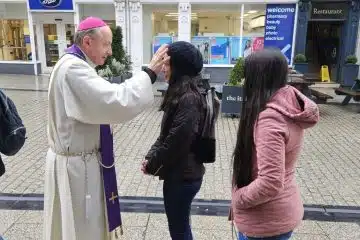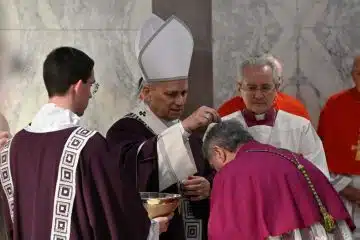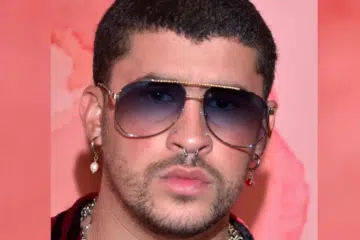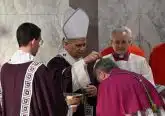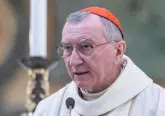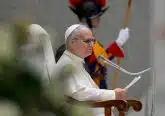Catholic journalist Ross Douthat discusses Pope Leo, religious revival, JD Vance
CNA Staff, Jun 7, 2025 / 08:00 am
Americans could be on the cusp of a religious revival. according to Ross Douthat, an author, Catholic convert, and New York Times columnist.
Douthat, who often writes on the intersection of faith, culture, and public life in his column, shared his thoughts on all things American and Catholic, from Pope Leo XIV to Vice President JD Vance to the American religious landscape, in an interview with Anchor Catherine Hadro on “EWTN News in Depth” on Friday.
Douthat described the U.S. religious situation as a “a very unsettled but curious landscape,” particularly after a years-long decline in religious interest that plateaued during the COVID-19 pandemic.
“It’s not that America is having a religious revival. It’s more that we’re considering whether to have a religious revival,” he said.
Interest in religion has moved beyond the hardline atheism of the early 2000s characterized by figures like Richard Dawkins, Douthat said. He observed that there has been “a surge of interest in religion,” especially among Generation Z.
Sometimes the interest is traditional, as reflected in rising numbers of converts to Catholicism in some dioceses, from Los Angeles to Dublin. Other times it takes on an alternative tone.
“You have a surge of interest in religion, and some of that shows up in traditional faith. Some of it shows up in anything from UFOs to psychedelics,” Douthat said.
Atheism, he indicated, has failed to keep its promises. In the early 2000s “there was a sense that once we get rid of these hidebound Bronze Age superstitions, everyone will get along better: Politics will be less polarized, science will be held in higher esteem and sociologically people will be happier. Kids won’t be afraid of going to hell, things like that.”
“And obviously none of that has happened.”
Douthat cited rising division, polarization, and “existential angst” in the nation in recent years as setting the groundwork for a resurgence of religion.
“You have a lot of people, some of whom are coming into the Church, others who are exploring around the edges, who are reacting to that environment,” he said.
First impressions of Pope Leo: a unifying figure
When asked to describe the new pope, Douthat called him “unifying,” “charming,” and “mildly inscrutable.”
Douthat says that inscrutability is “part of the reason he was elected pope in the first place.”
“There is still a hint of mystery to who the pope definitively is and what he definitively thinks,” he said. “And there may be a long period of time where that mystery gradually unfolds in the life of the Church.”
Douthat noted that Leo was a “dark horse” figure “who’s very good at making different groups of people feel heard and understood.”
Leo’s episcopal motto is one of unity: “In Illo Uno Unum,” meaning “in the One, we are one.” Douthat said he hopes Leo will bring about this unity.
“Obviously there were a lot of conservative and traditionalist Catholics who were frustrated or anxious at various moments in the era of Pope Francis,” he said.
“[Leo] hasn’t really done all that much — it’s been one month — but there’s so far this sense of just sort of relief at a feeling of kind of stability and normalcy in the papal office,” Douthat said.
Pope Leo XIV chose his name because the last pope with that name, Pope Leo XIII, “was pope at a time of huge industrial and technological transformation and offered a distinctively Catholic witness for that age,” Douthat noted.
“There is this landscape that people live in online, disconnected or connected in new ways,” he said. “That is, I think, clearly perilous to the soul in various ways.”
The digital and AI realms have “deep effects on family and marriage and community,” especially for parents raising kids in this environment.
“There are fundamental questions of morality and spirituality that are bound up in how you relate to your phone,” he continued. “And I think it is really important for the Church to figure out what to say about it.”
JD Vance interview
Douthat recently interviewed Vice President JD Vance, a Catholic convert, about how faith shaped his politics, among other topics.
Reflecting back on a part of the interview where he asked Vance about the Church’s teachings on immigration, Douthat said that he was “pressing” the vice president because he believed there were “real tensions” in the dispute, citing deportations by the Trump administration.
Vance and Pope Francis had publicly disagreed on politics earlier in the year. In February, Pope Francis sent a pastoral letter to the U.S. bishops calling for the recognition of the dignity of immigrants after Vance, a Catholic convert, publicly advocated applying “ordo amoris,” or “rightly-ordered love,” to the immigration debate.
“[A]s an American leader, but also just as an American citizen, your compassion belongs first to your fellow citizens,” Vance said at the time, while acknowledging that the principle “doesn’t mean you hate people from outside of your own borders.”
In the letter, Francis tacitly rebuked Vance’s remarks, arguing in part that “the act of deporting people who in many cases have left their own land for reasons of extreme poverty, insecurity, exploitation, persecution, or serious deterioration of the environment damages the dignity of many men and women.”
Douthat noted that Vance’s situation is a “tremendous challenge,” especially because he is vice president, not president.
“There’s always a certain kind of tension between being an elected politician in a pluralist, non-Catholic society and trying to be faithful to the teachings of the Church,” he said.


